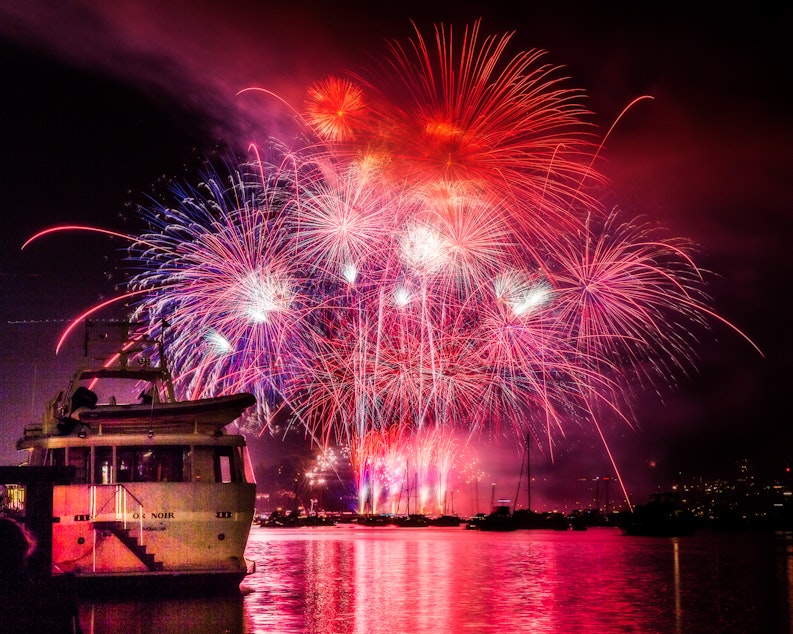Why these Seattleites say they’ve ditched Independence Day celebrations

Char Smith, 31, said he grew up loving Fourth of July celebrations. “I loved the flag. I loved the country,” he said. “As a small autistic kid in the 1990s, it was easy for me to never have to look at the abject reality of this country's history: the genocide of Indigenous and African peoples and cultures, the financing of the worst war crimes in recorded history, the intentional cruelty towards the poor both at home and abroad.”
But Smith decided to stop celebrating the Fourth of July around the age of 11, after reading about American history at his local library, post-9/11. The question he set out to answer: “How anyone could possibly hate this country to the degree that they would be willing to kill 2,500 people to make a point.”
“9/11 forced me to take a hard look at what happened before to create the America of today,” he said. Smith, who is white, also pointed to a deepened understanding of his own family’s immigration story as a catalyst for abandoning Independence Day celebrations.
“My grandparents and their parents were fleeing ethnic cleansing on one side and the threat of murder from colonial police on the other,” he said. “For us, this wasn't supposed to be the land of opportunity — it was just supposed to be the land of 'this is safe enough.’ And to some degree it was. But in other very important ways, it wasn't.”
Tye Reed, 26, said she grew up participating in Independence Day celebrations, seeing it as an opportunity to kick back and relax with family and friends.
Sponsored
“I feel like it's a pretty big holiday in the Black community — people doing cookouts, wearing Fourth of July outfits,” she said. “But I never really associated it with pro-American sentiment. It was just me going to my cousin's house, getting my hair done, and doing fun things. I definitely enjoyed it as a kid.”
But like Smith, Reed said there was a point at which she began to associate the holiday with the country’s history of colonialism and violence.
“Who in the world would want to celebrate this mess of a country? It's not just a celebration of the past, it's a celebration of the ignorance of the present that gets to me, too,” Reed said. “I can't imagine celebrating a world tied to the enslavement of my ancestors.”
Ray Arias, a descendant of the Apache Tribe, shared a similar perspective. The 27-year-old said that while her mother would dress Arias and her siblings in red, white, and blue outfits so they didn't feel left out among other children, Independence Day served as a reminder of the violence inflicted upon Native Americans by white settlers.
"Growing up, it was never big in my household," Arias said. "My older brother in particular was very anti-colonizer holidays. We’re Indigenous, so just even trying to decolonize my own life, I really tried to be critical about what I chose to promote and how I chose to talk about it.”
Sponsored
Arias also pointed to the recent federal recognition of the Juneteenth holiday, long celebrated by Black Americans to commemorate the freeing of enslaved people. She said she hoped that both larger-scale observance of Juneteenth and the widespread protests for racial justice last summer would encourage people to interrogate their reasons for celebrating Independence Day.
"July Fourth represents a time when not everyone was free because we live in an imperialist settler state. And celebrating freedom for some but not all is hypocritical. If you’re just going in and celebrating the Fourth of July without critical thought, it detracts from the movement [for racial justice] that started last summer."
For Timothy Bell, traditional Fourth of July festivities symbolize a lack of regard for the environment.
“Something about shooting rocket-propelled garbage into the air and onto the streets, sewers, rivers, lakes, beaches, has never felt right,” he said in a tweet. “A moment of joy for a lifetime of pollution. Plastic to air pollution to noxious powders leaking from spent firework casings — it’s all bad.”
Others have cited the potential for the pyrotechnic events to distress combat veterans with post-traumatic stress disorder and traumatize pets as reasons they forgo Fourth of July celebrations.
Sponsored
Such concerns have led to fireworks being banned in many Puget Sound cities, including Seattle, Bellevue, Renton, Federal Way, Tacoma, Everett, and Edmonds. Starting in 2022, the sale and use of fireworks will be banned countywide in both King County.
Meanwhile, King County Fire Marshal Chris Ricketts is urging residents to abstain from setting off fireworks, in light of the abnormally high temperatures that gripped the region over the past week.
“The safest bet this year is to avoid lighting them altogether,” Ricketts said in a statement. “Conditions are extremely dry given the recent extreme heat wave. If you do light fireworks, people must be aware of their surroundings and potential dangers.”
Additionally, a temporary ban on outdoor burning, with the exception of small fires set for barbecues and recreational purposes, remains in effect for unincorporated King County until further notice.




